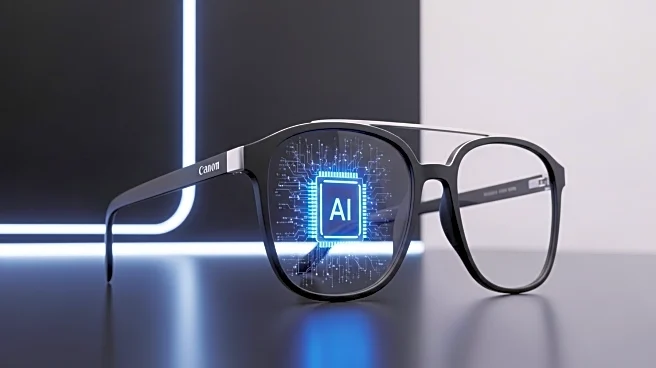What's Happening?
Meta has announced the launch of its Ray-Ban Display smart glasses, priced at $799, with a release date set for September 30, 2025. This marks a significant push into the consumer market for augmented reality (AR) wearables, as the glasses come equipped with a wristband controller and Meta's AI assistant. The launch aims to integrate AI into everyday life, offering features such as hands-free prompts and memory recall. However, during the product demonstration, glitches were observed, raising questions about the reliability of the software and its impact on consumer adoption. Meta's decision to price the glasses at $799 positions them as a consumer product rather than a niche developer kit, with the timing of the release coinciding with the holiday shopping season.
Why It's Important?
The introduction of Meta's Ray-Ban Display glasses represents a pivotal moment in the wearables market, potentially shifting AR technology from novelty to utility. The glasses are designed to offer a more immersive experience by integrating AI, which could redefine how consumers interact with technology in daily life. The success of this product could influence the broader adoption of AR technology, impacting industries such as retail, entertainment, and communication. However, the initial software glitches could affect consumer trust and adoption rates, highlighting the importance of software reliability in the success of AR products. The competitive landscape includes cheaper alternatives from Amazon and Snap, which could influence market dynamics and consumer choices.
What's Next?
Meta is expected to focus on rapid firmware updates and software improvements to address the initial glitches observed during the demonstration. The company will likely engage developers to enhance the AR user interface and expand the accessory market around the wristband controller. Consumer feedback and adoption rates will be critical in determining the long-term success of the Ray-Ban Display glasses. As the holiday season approaches, Meta's marketing strategies and consumer reception will play a significant role in shaping the future of AR wearables. Industry analysts will be watching closely to see if Meta can overcome the initial hurdles and establish a strong foothold in the consumer AR market.
Beyond the Headlines
The launch of Meta's Ray-Ban Display glasses raises ethical and privacy concerns, as the integration of AI into wearable technology could lead to increased data collection and surveillance. Consumers may weigh the benefits of enhanced functionality against potential privacy risks. Additionally, the success of these glasses could drive innovation in AR technology, leading to new applications and use cases that could transform various sectors. The development of AR wearables also poses cultural implications, as it may change how individuals interact with their environment and each other, potentially altering social norms and behaviors.









